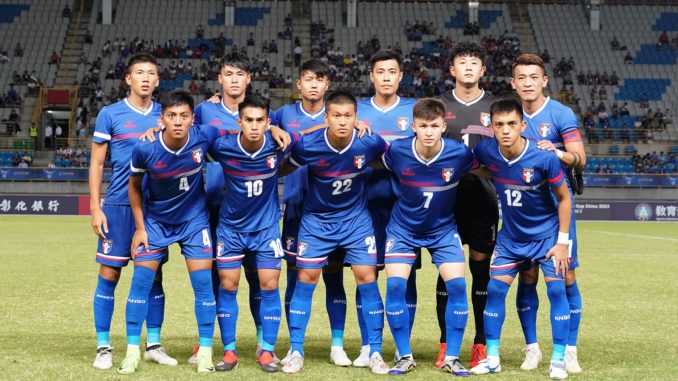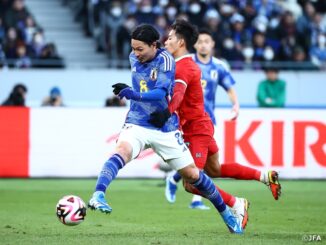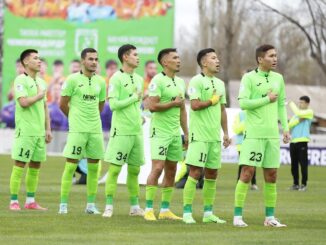
Let’s say I’d ask you to give me one Asian nation that’s currently living through the golden years of its entire history, or at least the modern era.
A couple of you would waste no time in shouting Vietnam in my face. Some would maybe suggest Tajikistan. Thailand or Syria might get a shout, too, though hardly in the first place.
And then there’s Taiwan. Tell me honestly: Do you ever think about Taiwan?
The last time I imagine that Taiwan — commonly (and disrespectfully) called Chinese Taipei — may have popped into your mind was at the July draw when they somehow appeared in Pot 3.
While they’d earned some plaudits for sturdy defensive performances against Vietnam and Iraq in 2018 FIFA World Cup qualifying, they also ended up wrapping up the cycle without a single point earned at home. All that while having the pleasure of hosting Brunei.
Macao twice, Malaysia (back in 2011 when they still stunk badly) and Brunei away — that’s the entire collection of Taiwanese triumphs in the World Cup qualifiers in this century.
And it may not improve anytime soon as Taiwan kicked-off this campaign with a 3-shot effort vs Jordan and a frustrating display against Nepal. A deflating pair of opening home losses followed by a Tuesday visit from Australia and four trips on the trot. Oof.
The islanders made for a different story in qualifying for the 2019 AFC Asian Cup, mind, especially with an impressive double over Singapore and a home victory against Bahrain, but however they’d racked up points for the FIFA rankings, Taiwan still only finished 3rd in their group.
That was their first real shot at an (expanded) Asian Cup, of course, and they blew it…
… or is that a harsh assessment? To a large extent, absolutely. We’ve come to expect precisely nothing from Taiwan after all. They last appeared at a continental U19 championship in 1970s, have not made any waves among U23s lately either, and their league only earned their first AFC Cup group stages slot in 2018.
Even Mongolia made their maiden appearance faster. In a lot of ways, we are still kind of getting used to Taiwan, and so by most conventional metrics, they rather overachieved — if anything — simply by remaining in the running for an Asian Cup spot till the very last matchday.

On the other hand, though, you look around and you can’t resist the feeling it was doable; Turkmenistan did seem strippable in at least one of the games, and it’s painfully clear what really cost Taiwan.
They didn’t score a single open-play goal vs Turkmenistan (Chen Po-Liang converted two penalties) and finished with a negative five goal differential that ultimately trailed both Hong Kong and Afghanistan who otherwise (points-wise) coped worse in groups that were more top heavy, more challenging.
“Never mind,” one would be tempted to conclude — it was their first big chance; others will surely come. Fair enough. But looking at the current Taiwanese roster, one also sees the real sense of urgency if not fatality.
As many as eight players born in 1992/1993 were involved in the two September games, meaning this cycle very much overlaps with the peak years of a majority of this crop.
That group includes Chen Hao-Wei, exciting ball carrier who tormented Nepal by 13 completed dribbles with no one else quite able to catch on. No wonder there have been serious attempts to clone him. Captain Chen Po-Liang, the best Taiwanese on other days, meanwhile turned 31 in August. The clock is ticking on him louder than anyone.
This is not the oldest squad in Asia or such, but the best generation in decades may have already arrived… and be gone soon-ish. By the time the 2026 World Cup qualifiers roll around, ten of those who started last month vs Jordan will be either on the wrong side of 30, or likely retired.
Of course, a lot can change in four years’ time, but unlike many countries whose ageing squads can fix themselves from within a rich talent pool, Taiwan don’t have such luxury.
The country’s population of 23.6 million is comparable to that of Cameroon or Australia, but the footballing landscape is decidedly not. There has been a talk of professionalisation of the country’s top flight for a long while now, but any serious progress is hard to make when you fully depend on the government’s money while your games are watched mostly by the players’ relatives and friends who on occasion benevolently ditch the way more popular baseball (or basketball) for their loved ones.
Since 2017, Taiwan is running its own Premier League instead of the unfashionably named Intercity Football League, suggesting fancy rebranding, but the transformation has been far from full-scale.

Tatung FC and Taipower FC continue to form a two-way peloton with no challengers. They are backed by two financial titans — Tatung Company which supplies rice cookers to literally every household and the Taiwan Power Company, the state electricity provider — but many of their players still have other jobs.
Ironically, as far as Mark of From the Tofu Bowl is aware, these two clubs don’t even possess the sort of AFC license that’s needed for entering international competitions.
That’s why this year’s AFC Cup again welcomed Hang Yuen — Taiwan’s third club affiliated with Fu Jen, the oldest Catholic university in the Sinophone world. In 2018, Tatung withdrew at last minute and since then, no breakthrough has been registered. Earlier this year, at last, the Chinese Taipei Football Association (CTFA) held a workshop to get everyone to obtain the license by the start of the next season.
These issues are not unique to Taiwan; Benfica Macau got in the same jam just recently. But obtaining this single document would go a long way in achieving the CTFA’s proclaimed goal of achieving full professionalization of the Taiwan Premier League, because the licensing process requires the club to have some basic infrastructure in place and run “at least two youth teams within the age range of U15 and U18″. I mean… the regulations are typed out in a very questionable font, but don’t they go deep.
As ever, the real question is: will it actually get enforced? Will the plan go through?
Youth development has long been neglected in Taiwan and even though the U16s still got hammered by South Korea 0-10 only this past September (while Myanmar and Thailand held them to tight losses 0-1 and 0-2), there is some reason for optimism.
Chiou I-jen was re-installed as the CTFA president only a year ago and his influence is already being felt, following a disastrous tenure of his predecessor Lin Yung-Cheng. Chiou I-jen has presided over Taiwanese football before (2005-10), and while he’s no spring chicken himself at 69, he retains great passion for football, still goes for a weekly kick about as a left wing, and has promised to integrate young decision-makers on all levels.
The hope now is that Taiwan will soon be able to produce capable generation after capable generation, but the gaping hole behind the current one continues to loom large.
As Chen Po-Liang is now seemingly entering the ‘Keisuke Honda’s twilight years’ territory — in a withdrawn central midfield role, he can still produce a cunning pass or a decent long-range shot but looks seriously off the pace most of the time and fails to impose himself on games every so often — Taiwan will soon feel the need to vet younger players, and given the aforementioned limits at home, diaspora may come into play.
Mark could list nine players born outside of Taiwan and yet dressed by them, one of whom (Chu En-Le) was naturalised through marriage. Only Spanish-born Víctor Chou (2009) and Will Donkin (2017) have been brought into the senior national team early on in their careers, however, and the former was aided by playing locally at one point. There is still hope for Emilio Estevez (21) and particularly Miguel Sandberg (17), to be fair.
The process of naturalization has been anything but systematic and, in some cases, anything but smooth.
To be clear, complications only happen when a shady middleman contacting players by himself gets involved; such practice has previously hampered the integration of now retired Xavier Chen and current Henan Jianye midfielder Tim Chow.

Both these players, lamentably, had gotten some high quality football education at Anderlecht and Wigan respectively, making for great potential difference-makers.
Now all that pressure falls squarely on the shoulders of Will Donkin. He took a very different route — his mother simply one day contacted the CTFA with a “hey, here’s my boy, ready to shine” message, and there he was indeed, debuting at the tender age of 16.
Still a teenager, Donkin is a gifted left winger who could star for Taiwan, but much now depends on how he settles in Norway, having signed for Stabæk just days ago. The 18-year-old, affectionately known as ‘Doughnut Boy’ in Taiwan, left Crystal Palace for a new challenge but can’t play until January due to a closed registration period.
Would a properly developed, contributing Will Donkin alleviate the long-standing goalscoring issue? Quite likely. Could it be enough for an Asian Cup participation? Hard to say. Taiwan could sure use an extra Marcus Fenelus, former MLS draftee who’s been killing it for Tatung domestically for the past 4 years.
Sadly, he’s already been capped by Turks & Caicos Islands back in 2014 only to be used scarcely since (because duh, who’d fancy jetting off almost 15,000km away from home for a near certain drubbing?).
The CTFA sadly doesn’t have the resources to actively fish for players abroad, so if you’re a decent footballer reading this and have Taiwanese blood running through your veins at the same time, don’t be shy and get that ball rolling by contacting either the CTFA itself or my friend Mark who’s always happy to assist.
If you happen to be a striker, please do so especially quickly.
Photos: Chinese Taipei Football Association Facebook
Listen to young star Will Donkin on Episode 16 of The Asian Game podcast.




